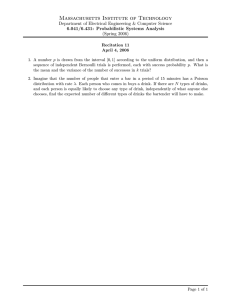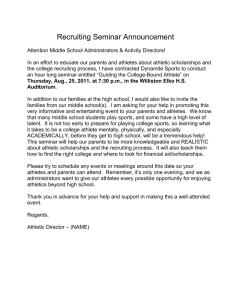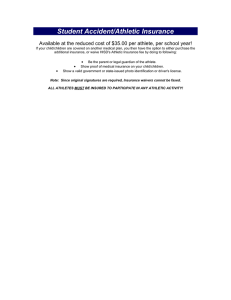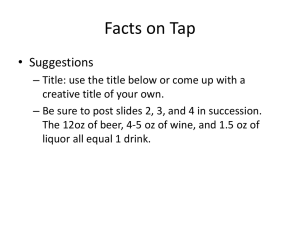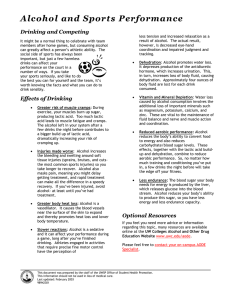8 Things You Can Do to Help Yourself Be The...
advertisement
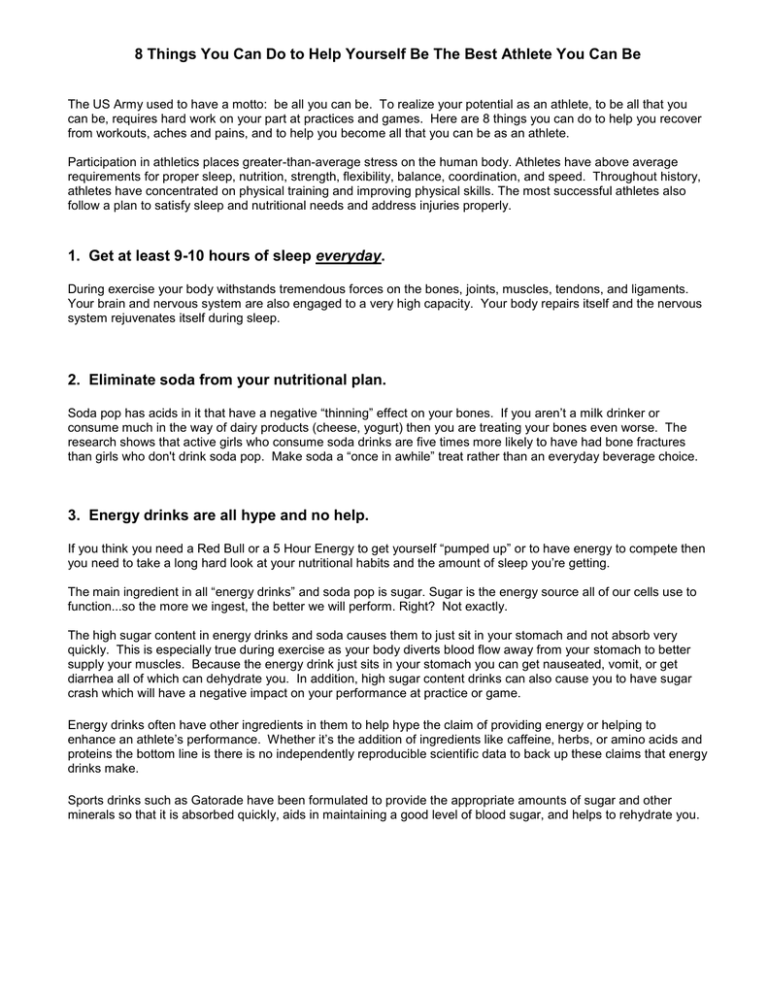
8 Things You Can Do to Help Yourself Be The Best Athlete You Can Be The US Army used to have a motto: be all you can be. To realize your potential as an athlete, to be all that you can be, requires hard work on your part at practices and games. Here are 8 things you can do to help you recover from workouts, aches and pains, and to help you become all that you can be as an athlete. Participation in athletics places greater-than-average stress on the human body. Athletes have above average requirements for proper sleep, nutrition, strength, flexibility, balance, coordination, and speed. Throughout history, athletes have concentrated on physical training and improving physical skills. The most successful athletes also follow a plan to satisfy sleep and nutritional needs and address injuries properly. 1. Get at least 9-10 hours of sleep everyday. During exercise your body withstands tremendous forces on the bones, joints, muscles, tendons, and ligaments. Your brain and nervous system are also engaged to a very high capacity. Your body repairs itself and the nervous system rejuvenates itself during sleep. 2. Eliminate soda from your nutritional plan. Soda pop has acids in it that have a negative “thinning” effect on your bones. If you aren’t a milk drinker or consume much in the way of dairy products (cheese, yogurt) then you are treating your bones even worse. The research shows that active girls who consume soda drinks are five times more likely to have had bone fractures than girls who don't drink soda pop. Make soda a “once in awhile” treat rather than an everyday beverage choice. 3. Energy drinks are all hype and no help. If you think you need a Red Bull or a 5 Hour Energy to get yourself “pumped up” or to have energy to compete then you need to take a long hard look at your nutritional habits and the amount of sleep you’re getting. The main ingredient in all “energy drinks” and soda pop is sugar. Sugar is the energy source all of our cells use to function...so the more we ingest, the better we will perform. Right? Not exactly. The high sugar content in energy drinks and soda causes them to just sit in your stomach and not absorb very quickly. This is especially true during exercise as your body diverts blood flow away from your stomach to better supply your muscles. Because the energy drink just sits in your stomach you can get nauseated, vomit, or get diarrhea all of which can dehydrate you. In addition, high sugar content drinks can also cause you to have sugar crash which will have a negative impact on your performance at practice or game. Energy drinks often have other ingredients in them to help hype the claim of providing energy or helping to enhance an athlete’s performance. Whether it’s the addition of ingredients like caffeine, herbs, or amino acids and proteins the bottom line is there is no independently reproducible scientific data to back up these claims that energy drinks make. Sports drinks such as Gatorade have been formulated to provide the appropriate amounts of sugar and other minerals so that it is absorbed quickly, aids in maintaining a good level of blood sugar, and helps to rehydrate you. 4. Water, water, water. Fluid replacement is probably the most important nutritional concern for athletes. When you exercise you lose water and minerals in your sweat and through your breathing. If you aren’t replacing this lost fluid you will get dehydrated which will have a negative impact on your performance. Additionally, in hot weather dehydration plus a lack of water intake can make you much more susceptible to developing heat cramps, heat exhaustion, or in a worse case scenario heat stroke. These heat illnesses are preventable by making sure you take in plenty of water. Proper fluid replacement is the key to preventing dehydration and reducing the risk of heat injury during training and competition. If you wait until you are thirsty to replenish body fluids, then you are already dehydrated. And, if you only drink enough to quench your thirst, you may still be dehydrated. During the school day, pack around a bottle of water with you and drink some during each passing period and especially during lunch. This will help to insure that you are hydrated when you get to practice instead of playing catch up on your fluid intake right before practice. *An athlete should drink plenty of water before athletic performance. Experts recommend 17-20 fl oz of water or sports drink to be consumed 2-3 hours prior to activities. *It is recommended that 7-10 fl oz every 10-20 minutes during activity. Those who sweat more should consume more. *Athletes are encouraged to drink 16-32 fl oz of water or a sports drink after activity. 5. Eat to compete. How far will a car go without gas in the tank? The same holds true for athletes. If you don’t feed your body your performance will suffer. You could find yourself running out of gas (energy) towards the end of a game when it’s critical that you be ready to make a play that could mean the difference between winning and losing. Additionally, when you are fatigued, have run out of gas, and are dehydrated you are much more likely to get injured. Proper nutrition is one of the keys to recovering from injury as well. There are literally hundreds of books on nutrition. The internet is full of nutritional advice for athletes. Here are a few general ideas for proper nutrition for athletes: On practice days: Eat breakfast. Make sure you eat a good lunch and make sure you are drinking water regularly throughout the day. Avoid fast food. It tends to be higher in fat content, digests slower, and just sits in your stomach. Take advantage of all water breaks during practice. On game days: Try to eat foods that you know won’t upset your stomach and try to eat several hours in advance of your competition. Fast food should not be a consideration as part of a pre-game meal because of their high fat content. Think pasta, breads, fruits, cereal, or energy bars as pre-game meal ideas. Drink plenty of water during the day and with your meals. Eat to recover after a practice or competition: It is extremely important to eat properly after a hard practice or competition to help your body recover. The best time to eat for recovery after exercising is within 30-45 minutes. Eating after this time drastically diminishes the effectiveness of the recovery meal. Chocolate milk, some turkey or chicken (about the size of a deck of cards), spaghetti with meat sauce, or even a quality breakfast cereal and milk all give you the right amount of carbs and proteins to help your body recover from the stresses of a hard practice or competition. Continue drinking water or products like Gatorade to rehydrate yourself and to replenish the minerals you may have lost in your sweat. 6. Take care of your injuries. If you are going to be active by playing sports you can expect some aches, pains, and injuries. Recovery is an active process. You can’t wish yourself back from an injury … you have to work your way back from an injury. DO: Report your injuries to the athletic trainer. There are many things he can do to help you recover faster. When in doubt use ice on any aches or pains. If you are given some home care instructions for treating your injuries please follow through with those directions. DON’T: Ignore your injury. Waiting several days to several weeks and trying to play through injury is not proper injury care and can make things worse and delay your recovery and return to sports activity. Don’t heat any injury unless specifically told to do so by the athletic trainer. Heat can make injuries worse by increasing swelling. The vast majority of athletic injuries are not severe enough to warrant an emergency room visit. Please use emergency rooms for what they were meant for: EMERGENCIES. There are much better resources for injury care such as the certified athletic trainer and the team physician that specialize in taking care of sports injuries. 7. Wear the appropriate footwear for your sport or activity. Wear the correct shoes for the activity you are engaged in and lace them up. Proper footwear, that fits correctly, and are laced up provide better support for your feet and reduce the forces that are transmitted to your ankles, legs, knees, and hips. Remember, running shoes are made for running, skater shoes are made for looking cool and not for being athletically active. Also, flip flops are for getting to and from the shower or for cruising around the pool. They are among the worst things for your feet as an all day every day type “shoe”. 8. Listen to your body. The only person who can feel how your body is responding to sports activity is you. When you are injured your body speaks the language of pain. Listen to that. Re-read #6. Pay attention to #1 and #5.
